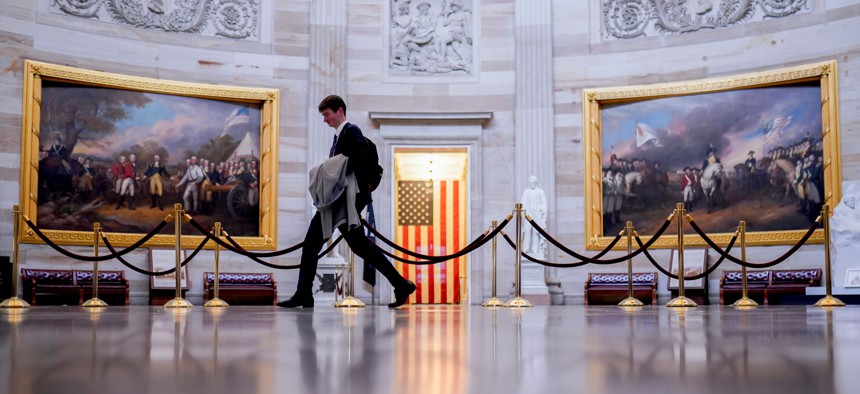Congress finally approves spending budget, nearly six months late

Though the vote came two hours after a midnight deadline, there will now be no government shutdown after the Senate approved a second package of six spending bills in a 74-24 vote. Nathan Howard via Getty Images
The vote in the House and Senate averts a shutdown and brings funding certainty. But several programs significant to state and local governments will see cuts.
Ending months of uncertainty for state and local governments, Congress Saturday morning finally agreed on a budget for the fiscal year that began nearly six months ago on Oct. 1.
Though the vote came two hours after a midnight deadline, there will now be no government shutdown after the Senate approved a second package of six spending bills in a 74-24 vote. Earlier in the day, the House voted 286-134 to pass the bills. The vote came two weeks after Congress approved the first set of six spending bills.
“We are not punting through yet another continuing resolution,” said Sen. Susan Collins of Maine, the top Republican on the Senate Appropriations Committee. Congress had hurried to pass the bills not only to prevent a shutdown but also to allow Collins to attend her mother's funeral on Saturday,
Some programs significant to state and local governments will see cuts, and a program to help low-income people afford internet service will not receive funding to continue past the end of next month.
The bills passed despite strong opposition from conservatives, particularly in the House where members of the Freedom Caucus were outraged that Speaker Mike Johnson agreed to a deal with Democrats that kept funding for federal programs at roughly the same levels as last year.
The package “did not represent our conference,” Marjorie Taylor Greene, a Georgia Republican, told reporters after filing a motion to remove Johnson as speaker. “He is not doing his job.”
In addition to not making what Democratic Senate Majority Leader Chuck Schumer described as the “draconian cuts” Republicans had sought, conservatives were also outraged that the spending bills didn’t include proposed changes to immigration policies.
Conservatives were so opposed to the package that some were willing to allow the government to shut down.
“Cut the lights off,” said Rep. Ralph Norman, an Oklahoma Republican. “And until the Senate accepts a total shutdown of the border … we don't come back.”
Averting a shutdown will likely delight states and local governments, who have repeatedly urged Congress over the past six months to reach an agreement and provide certainty around federal funding.
Friday’s package failed to fund the Affordable Connectivity Program, which provides a $30-a-month subsidy to low-income households for internet access.
Congressional leaders also agreed to cut funding for the Federal Emergency Management Agency’s Shelter and Services Program by $150 million, from $800 million to $650 million. Local governments had hoped to receive $1.4 billion in funding, as many cities like Chicago, Denver and New York continue to struggle to shelter and support the millions of migrants that have been bused up from the Texas border.
A federal program to help places of worship like synagogues and mosques shore up their physical security amid a surge in hate crimes has been cut as well. The Nonprofit Security Program will receive $274 million, about 10% less than last year.
“I'm disappointed about that part of the agreement,” Sen. Chris Murphy, a Connecticut Democrat, said in an interview. However, “Republicans’ priority was to lower all the grant programs.”
Murphy, who has called for increasing funding for the program, noted that a funding bill providing funding for the Ukraine and Israel would have added $160 million for the program. However, it has not been taken up by the House. Had Congress passed that bill, he said, “we would have dramatically increased the program.”
Sen. Patty Murray of Washington state, the top Democrat on the Senate Appropriations Committee, acknowledged more funding is needed to stabilize the nation’s child care system, which has been teetering ever since the nearly $40 billion in child care subsidies approved under the American Rescue Plan Act expired at the end of September. But she said that Friday’s packages will increase funding for Child Care and Development Block grants, which allows states to lower the cost of child care for families. Its budget will see a $725 million increase to $8.7 billion. The Head Start program would receive a $275 million increase to $12.3 billion.
The passage of the package of bills came two weeks after Congress approved the first set of six spending bills. Those bills also roughly keep spending at last year’s levels, although they include additional money for rental assistance and for states to continue providing food assistance to low-income women and their children through the Special Supplemental Nutrition Program for Women, Infants, and Children, or WIC.
Negotiators did agree to several funding cuts, though, including slashing $250 million from the HOME Investment Partnership Program, the largest grant program for state and local governments to build affordable housing.
Kery Murakami is a senior reporter for Route Fifty, covering Congress and federal policy. He can be reached at kmurakami@govexec.com. Follow @Kery_Murakami
NEXT STORY: Grants and growth: The infrastructure funding surge demands masterful management






